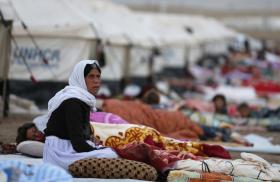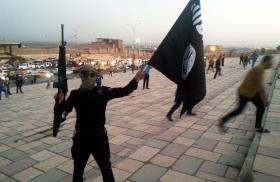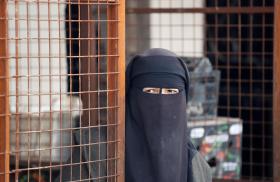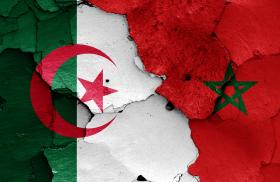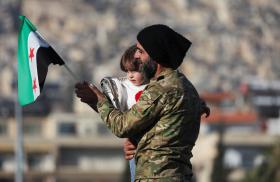
- Policy Analysis
- Counterterrorism Lecture
Iraq's Role in Countering the Islamic State's Finances

Part of a series: Counterterrorism Lecture Series
or see Part 1: U.S. Efforts against Terrorism Financing: A View from the Private Sector
Watch the governor of Iraq's central bank discuss steps to combat financial activity from the receding caliphate.
On October 16, Ali Mohsen Al-Alaq addressed a Policy Forum at The Washington Institute as part of the long-running Stein Counterterrorism Lecture Series. Dr. Alaq, a financial expert, policymaker, and academic, has served as governor of the Central Bank of Iraq since 2014. Following is an edited transcript of his remarks.
Good morning. I'm very pleased to have the opportunity to meet with you today. I’d like to highlight some important issues around our country, Iraq. First of all, I'd like to say that after years of patience, determination, and costly efforts, a clear picture of Iraq is emerging. It is an image of a country with a growing capacity to manage its affairs in a very modern fashion and to make the investments needed to secure a better future. In building a state -- a peaceful, new Iraq -- we are making progress across many fronts, the security and economic fronts chief among them.
Despite all this progress, challenges remain. Virtually every day in news reports from Iraq, the military support the country has received from foreign partners is on display. Sixty-eight nations are members of the military coalition united in an effort to destroy ISIS [as the Islamic State is also known]. But international support for Iraq extends well beyond military support to include economic and financial cooperation as well. Reconstruction is backed by key international stakeholders, and Iraq is hopeful that the donors' conference to be held in Kuwait in the coming months will help the country. Indeed, the conflict with ISIS caused very wide disruptions, including the emergence of some three million internally displaced persons.
Now, in looking closely at the macroeconomic picture, I'd like to point out some indicators from the recent IMF report, released in September 2017. Inflation remains -- according to the IMF report -- very low, at less than 1 percent. Real GDP [growth] was about 11 percent in 2016. The overall balance of payments was stronger than the program during the first half of 2017. Also, the spread between the official and parallel exchange rates for U.S. dollars decreased from 10 percent in December 2016 to 6.7 percent in September 2017. Iraq successfully issued $1 billion in euro bonds in early August 2017 and enjoyed about $6.7 billion worth of investors' demand -- suggesting a very positive credit outlook for the country. The stock of gross reserves of the Central Bank of Iraq (CBI) exceeded the agreed-upon program floor by about $4 billion for 2017, as of now. The gross public debt remained below the suggested program ceiling.
Hit by the fall of oil prices and ISIS, the government has started to implement a program of fiscal conservation to maintain debt and external sustainability. Given the current oil price projections and the implementation of fiscal conservation and of the stand-by arrangement (SBA), the fiscal and current account deficit should be eliminated by 2022, on schedule according to the program.
The CBI is committed to maintaining the peg to the U.S. dollar; the peg provides a key nominal anchor in a highly uncertain environment wherein policy capacity is affected by the conflict with the Islamic State. The CBI has removed all exchange restrictions and multiple-currency practices. To maintain macroeconomic stability, the government is committed to pursuing its fiscal conservation efforts to bring spending in line with available resources in 2017. To minimize the impact of fiscal conservation on the population, the government will continue to protect social spending, such as for health, education, and the social safety net.
Now, I'd like to talk about the CBI during uncertain times, in uncertain environments. Maybe I was not very lucky to have moved to the Central Bank at the end of 2014, because we faced two big shocks: one was, as you know, Daesh [another name for the Islamic State], and the other was the sharp decline in oil prices. They went down during 2015 by 40 percent, and in 2016 by 70 percent. So that was really a big challenge for the CBI. We have moved, at the Central Bank, because of all those challenges, from monetary stability to financial stability and economic growth in order to deal with the challenges created by those two shocks. We have taken many corresponding measures. For example, we have worked very hard with the government to navigate the financial difficulties of the period through quantitative easing. Thus, the Central Bank has discounted treasury bills from the government by about $20 billion so far, a high amount when measured against the total national budget. Steps also included enhancing and supporting the private banking sector, safeguarding the financial sector from financial crimes and money laundering, and developing the national strategy for anti-laundering and countering the financing of terrorism. The latter entailed developing the national strategy for AML/CFT, implementing the AML/CFT bill within the Central Bank, and establishing an AML/CFT national council. In that regard, I think we have done a lot with our international partners, at a very difficult time, to face the Islamic State. So we tried our best to cut off all the [ISIS] financial networks from the system, including hundreds of [suspect] exchange shops and wire transfer companies. Also, we submitted some cases to the court, facilitating a first for our country: the hearing of such cases in front of the court...So it gives an indication that the new laws in place, the new measures and regulations, the oversight for the banking sector, have all been tightened to allow for such an outcome.
I think, with our international partners, we have done a lot. On a daily basis, we share our information with these partners, helping everyone involved reach the current levels of cooperation. The last report from the Financial Action Task Force was really very positive -- reflecting that the country has taken many steps in that regard.
To enhance our economy overall, we are carrying out a major initiative aimed at financing small- and medium-size enterprises. For this, the biggest program in the country's history, we allocated about $6 billion to finance the enterprises. Also, we have taken very serious steps within the Central Bank to establish new units to deal with tasks and functions that the Central Bank has never covered in the past -- such as for financial inclusion, risk management, compliance, consumer protection, provincial regulations, and risk-based audits. I think, through these measures, the Central Bank has moved from essentially the twentieth to the twenty-first century. By adding these functions, we have made this an institution to deal with all the challenges, the new tasks, that the other central banks have historically covered.
Finally, I'd like to refer to the recent developments in Kurdistan, which we feel very sad about. We are almost done defeating Daesh; the country is working very hard to rebuild and to allow people to return to their homes. Now, unfortunately, we are facing another challenge, which we hope will be solved in a political way, instead of through conflict. The latter path would be very hard for the country, which has paid a lot over the last three decades.
After the referendum, we at the Central Bank wrote right away to the prime minister of the Kurdistan Regional Government, asking if we, as a central bank, could continue doing our work there. This is because we have worked very hard with the KRG for about a year to exercise our oversight within the Kurdistan Region of Iraq. Before that, Kurdistan was really removed from CBI oversight. So, personally, I have had many meetings with the KRG prime minister, with the goal of establishing our oversight and also our supervision for the banking sector within the region. And then we signed an agreement, just two or three months ago, to open the Central Bank branch in Erbil. We have been arranging all the logistics to start working there -- and indeed we have started this work. Then, when the referendum happened, I sent a letter to the prime minister asking him, as I said, if we could continue our work. The answer was positive. Yes, you can continue doing your work. So we said, from our side, we have no problem. I spoke to the government, to the prime minister, also to the parliament, about prospects for aligning Kurdistan with our constitution, so that whenever we have a positive response, we can consider that a good sign, and we can continue doing our work there.
So, for the Central Bank, we feel that if we can still do our work, we have no problem. We don't have a negative way to deal with the situation there. But the escalation is moving very fast right now, especially in the media, so we have to see where that will end. Hopefully, as I say, it will end peacefully.
Frankly, I feel that what happened is very sad, but that it can lead to permanent solutions for our relationship between federal development and the KRG -- because many things happened in past years far outside the bounds of our constitution. Most such activity happened by political arrangements, which is, in my view, a very risky path -- and that's what we're seeing right now. Personally, I have expressed this perspective on many occasions. I previously served as secretary of the cabinet for eight years, and at that time I kept saying, we have to be in line with our constitution so that we don't accumulate problems that can lead to a future crisis. And that's what we are facing right now.
So what's happening now, maybe and hopefully it will lead to permanent solutions, permanent arrangements, in line with our constitution -- so that we don't face these kinds of problems every time. Thank you very much.

